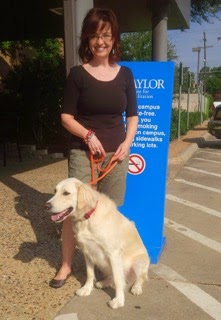 |
| Lynne Gentry |
Lynne Gentry has written for numerous publications and is a professional acting coach, theater director and playwright with several full-length musicals and a Chicago children’s theater curriculum to her credit. She likes to write stories that launch modern women into ancient adventures, such as The Carthage Chronicles series (Healer of Carthage, Return to Exile and Valley of Decision). Gentry is also an inspirational speaker and dramatic performer who loves spending time with her family and medical therapy dog.
If you felt the Holy Spirit urging you to quit writing, would you do it?
I confess that I regularly fight the urge to quit writing. These desires usually intensify whenever life becomes overwhelming. After much prayer, I’ve decided these urgings are not from the Holy Spirit. I feel my writing abilities are God-given gifts. The interruptions and distractions are not from the Lord. Therefore, my challenge is to push aside those urges to quit and to keep on writing. Only through prayer will I be victorious.
When working on a manuscript, what do you do when you get stuck?
I write by the seat of my pants. While this approach allows me a great deal of freedom, I can also write myself into some very tight corners. The best thing for me to do when I’m stuck is to READ. I have my go-to books (favorite novels) on a nearby shelf. Actually, I keep stacks of books everywhere. All I have to do is flip one open and start reading. A few minutes of reading time fires options in my head.
Do you ever read your dialog aloud to see how it sounds?
Absolutely. Since I’m stage-trained, for me it is often in the hearing of the words that I can detect breaks in thoughts or weaknesses in the dialogue. Do I read in front of anyone? Only my dear, sweet critique group.
 What aspect of being a writer is the most challenging for you? Why is this difficult, and what steps have you taken to overcome this hurdle?
What aspect of being a writer is the most challenging for you? Why is this difficult, and what steps have you taken to overcome this hurdle?
Writing is a solitary sport. For this extrovert sitting chained to a computer for days at a time can be sheer torture. I knew I was in trouble when my imaginary characters started to become my best friends. I was going to lose it if I didn’t out of the house more. I set up more speaking engagements. I volunteer at our church. I rescued a dog from the shelter and trained him as a medical therapy dog. The time Roman and I spend working the hospitals is a great way for me to get my “people fix.”
Do you read your reviews? Have you ever replied to one? Do you find they influence your writing when you work on subsequent books?
I don’t handle rejection well. This meme sums it up for me:
 So I find it strange that I love to read my reviews. After the initial sting of a bad review, I consider what was said. If I feel the reader has made a valid point, I make an effort to correct that in my next work. However, I’ve also been known to flip over to the negative reviews of some bestsellers just to encourage myself.
So I find it strange that I love to read my reviews. After the initial sting of a bad review, I consider what was said. If I feel the reader has made a valid point, I make an effort to correct that in my next work. However, I’ve also been known to flip over to the negative reviews of some bestsellers just to encourage myself. Does your best writing flow? Or are you most satisfied with the work that you’ve labored over, sweating and groaning?
My best story lines just flow, but I’m more satisfied with the writing when each word has been carefully chosen.
Do you prefer writing the initial draft, or do you enjoy the revision process more? Do you revise as you write, or do you first produce a big mess that you later have to fix? If your first draft is rough, do you usually have to cut out a lot of dead wood, or add flesh to the bare bones?
I’ve learned a lot at the feet of some fantastic editors. I like both parts of the process, drafting and editing. Since I revise as I write, my first draft is not usually a mess. There are holes and timeline issues, but those are easily fixed.
To keep up with Lynne Gentry, visit www.lynnegentry.com, become a fan on Facebook (Author-Lynne-Gentry) or follow her on Twitter (@Lynne_Gentry) and Pinterest (lynnegentry7). And don't forget to check out her latest book, Valley of Decision!
The Carthage Chronicles, Book #3: Thirteen years ago, Lisbeth made an impossible decision—leave third-century Carthage and her husband Cyprian behind for good. She knew it was to protect her daughter Maggie, so Lisbeth gathered the strength to move on with her life.
All these years, Lisbeth has thrown herself into her work and raising her headstrong daughter, all to live up to the promise she made to Cyprian. But Maggie is sick of being protected. In an act of teenage rebellion Maggie decides to do what her mother can’t—secretly returning to the third century on a quest to bring her father back, leaving Lisbeth no choice but to follow.
With Maggie’s surprise arrival in Carthage, chaos ensues. She finds her grandmother on trial for murder and attempts to save her, but instead the diversion sparks a riot that nearly destroys the plagued city. Only one thing will appease the wrath of the new proconsul of Carthage: the death of the instigator.
Will Lisbeth arrive in time to save her daughter from the clutches of Rome? How can God possibly redeem such a slew of unwise decisions and deep regrets? Filled with heart-wrenching twists and riveting action, Valley of Decision brings the romantic adventure epic, The Carthage Chronicles, to an electrifying conclusion. BUY HERE.



































